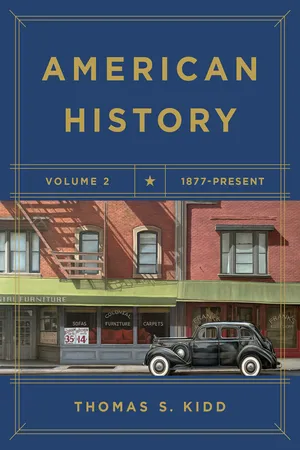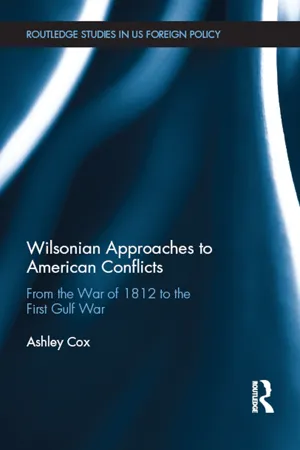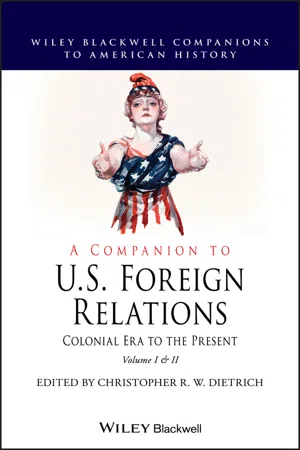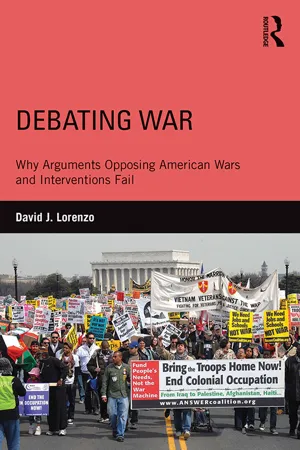History
America in WW1
During World War I, America initially remained neutral but eventually joined the Allies in 1917. The US played a significant role in the war effort, providing troops, supplies, and financial aid. The war ended in 1918 with the signing of the Treaty of Versailles.
Written by Perlego with AI-assistance
Related key terms
4 Key excerpts on "America in WW1"
- eBook - ePub
- Thomas S. Kidd(Author)
- 2019(Publication Date)
- B&H Academic(Publisher)
20
World War I
W hen World War I began, President Wilson vowed to keep America out of it. But as time wore on, it became more difficult for Wilson to maintain neutrality. Not only was Germany taking hostile actions against American ships, but it seemed that great world events were passing America by. Some Progressives demanded that Wilson keep his promise of neutrality. Reformers such as Jane Addams and Florence Kelley formed the American Union Against Militarism. Getting involved in a massive war overseas would inevitably undermine social reform at home, they argued. The pacifists vowed to throw a “monkey wrench into the machinery” of war preparations.Others, including journalist Walter Lippmann of theNew Republic , thought Wilson had dithered in the face of a war that could become the greatest engine of social reform America had ever known. “We Americans have been witnessing supreme drama, clenching our fists, talking, yet unable to fasten any reaction to realities,” Lippmann wrote. Out of the “horror” of war would come fresh opportunities for change in America. “We shall call that man un-American and no patriot who prates of liberty in Europe and resists it at home. A force is loose in America as well.” Lippmann and other Progressives were naïve about the effectiveness of using war to bring about positive domestic change. But as has always been the case in American history, this new war did bring about unpredictable transformations of American society and government.Mexican Revolution
World War I was not the only foreign policy crisis facing the Wilson administration. Although the United States had major financial interests in Mexico, it was not too concerned with the initial phase of the Mexican Revolution, which began in 1911 when the reformer Francisco Madero overthrew longtime Mexican ruler Porfirio Díaz. Just as Wilson was about to be sworn in as president in 1913, however, a Mexican military coup led by General Victoriano Huerta overthrew Madero’s government and killed Madero. With that Mexico descended into bloody chaos, and Wilson insisted that he would not recognize the new military regime. The Wilson administration supported Huerta’s enemies, and Huerta ultimately resigned in 1914. Wilson was reluctantly supportive of a new government headed by Venustiano Carranza, but Carranza met fierce opposition from an army headed by Francisco “Pancho” Villa. Villa, operating in northern Mexico, decided to resupply his army and provoke the Wilson administration by engaging in a 1916 cross-border attack at Columbus, New Mexico. Eighteen Americans were killed in Villa’s assault on the town. - eBook - ePub
Wilsonian Approaches to American Conflicts
From the War of 1812 to the First Gulf War
- Ashley Cox(Author)
- 2017(Publication Date)
- Routledge(Publisher)
This chapter will begin by addressing the traditional debates that focus on how the United States went to war for strategic and economic reasons. The second section will move on to discuss the Wilsonian interpretation of the events. The final section will address how we can use Mead’s Wilsonian framework to interpret Wilson’s decision for conflict and why this framework is an important analytical tool.The debateThis section will review the arguments that have been classically used to explain the American entry into the First World War. It will then go on to discuss the economic arguments that surrounded American entry into the conflict.The first strategic factor to consider is the classical interpretation of the origins of the First World War, which is that the United States acted only in its own strategic interest.7 This argument suggests that the United States had no need to concern itself with events in Europe until 1917 because Britain had been able to contain any potential hegemon. This section will begin by addressing the neo-realist assertion that the United States had pursued a ‘buck passing’8 strategy up to 1917 allowing the Allies to pay the price of containing Germany.9 This policy changed, so the realist argument goes, as the tide appeared to turn against the Allies in 1917. Thus the United States was forced to support the Allies when presented with potential German hegemony in Europe. In this analysis a victorious Germany would not only possess the strongest army in the world10 but it would shatter British naval supremacy, which played an important part in enforcing the Monroe doctrine.11 With the great powers of Europe defeated, Germany would be unopposed on its borders and as such could attempt to spread its influence to the new world and pose a threat to the United States.12 This scenario would not be appealing for the United States, which owed its own success in the Western Hemisphere to the lack of peer competitors and the balance of the European great powers. John Mearsheimer contends that ‘the United States entered World War One in good part because it thought that Germany was gaining the upper hand’.13 - eBook - ePub
A Companion to U.S. Foreign Relations
Colonial Era to the Present
- Christopher R. W. Dietrich(Author)
- 2020(Publication Date)
- Wiley-Blackwell(Publisher)
Chapter Fifteen Wilson's Wartime Diplomacy : The United States and the First World War, 1914–1918Ross A. KennedyAmerican foreign policy during World War I has generated contentious debates among historians seeking to understand its character and significance. This essay will focus on President Woodrow Wilson's diplomacy toward the Allies and Germany from 1914 through the conclusion of the armistice on November 11, 1918. Although Wilson's statecraft produced a lively debate between his defenders and so‐called “revisionists” in the 1920s and 1930s, the essay's historiographical analysis will limit itself to major works published in the last sixty years or so. Broadly speaking, these relatively recent historians have divided into two camps. The first consists of scholars who largely follow the interpretation of Arthur S. Link, Wilson's leading biographer and the editor of a sixty‐nine volume collection of the president's papers. This group includes prominent historians such as John Milton Cooper, Jr., and Thomas J. Knock. They portray Wilson as a pragmatic idealist and have few criticisms of the president's approach toward the war. The second group is more diverse in their views but its members share a tendency to qualify or reject Link's interpretation. The Link school's narrative has for all practical purposes become the “standard” one in the field – the interpretation, in other words, that most other scholars react to in one way or another.The Neutrality Period
The standard interpretation and its alternatives diverge most clearly in how they analyze Wilson's policy on neutral rights from August 1914 to April 1917, when the United States entered the war. The standard argument emphasizes that Wilson tried to be as impartial as he could toward the belligerents. Link concedes that early on Wilson expressed “sympathy” for the Allies; privately stated that a German victory would force the United States to become a “military nation;” and accommodated Britain's initial maritime system, including a minefield laid in the North Sea, that aimed to cut off Germany's trade with the outside world (Link 1960 , 50–51). But Link and his supporters nevertheless argue that Wilson was not biased in favor of the Allies. They dismiss the president's early statements of fear and hostility toward Germany as “emotional reactions” brought on by Germany's invasion of Belgium and its initial military success against France (Link 1960 , 51). Once the Allies stopped the German advance in mid‐September 1914 and Wilson had time to think hard about the war, he adopted a stance marked by “a remarkable degree of detachment, impartiality, and understanding” (Link 1960 - eBook - ePub
Debating War
Why Arguments Opposing American Wars and Interventions Fail
- David J. Lorenzo(Author)
- 2015(Publication Date)
- Routledge(Publisher)
There are few explicit references to power relations among this sample of arguments. The presence of Kantian Practical arguments did underline the understanding that the war would not be fought cheaply or won easily, thus gesturing towards recognition that the US was not dominant. There was also the implicit understanding of relative power relations when Europe was presented as a region that American power could not reform. But here American power was compared with the task of transformation, not with the power of other nations in contests of strength. Arguments were not founded on the observation that the US was too weak to make a decisive impact on the war.The failure of these arguments to derail entry into the war might be explained by several factors. First were the inevitable forces of nationalism and patriotism. It was difficult to overcome the observation that Germans had sunk American vessels and were scheming against American security with the Mexican government. Attempts to blunt these observations by referring to the finer points of neutrality policies and the fact that some people would profit from the war not only appeared bloodless in comparison; they are species of what will later be deemed “blame America” arguments; that is, arguments that place the burden of proof, bad faith and responsibility on American actors. It does not matter whether or not such arguments are supportable; they are problematic because non-elites usually take them as unpatriotic attacks on American character, pride, nationalism, defense and loyalty, and elite supporters of intervention are able to exploit such characterizations to delegitimize the delegitimizers.Critics of Participating in WWIIThe period between WWI and WWII in the US has been characterized as one of profound disillusionment with active involvement in foreign affairs. Many people, including both elites and non-elites, decided that the US entry into the Great War had been a mistake (as demonstrated by the results of the war) and was justified on specious grounds. The world was not made safe for democracy; rather, it appeared that it was made safe for an expansion of British and French imperialism. Arms manufacturers had made a killing while ordinary citizens, both those who had served in the military and innocent civilians, had merely been killed. Colonies were not freed; rather, they were transferred to the victors. The fact that the German holdings in China were awarded to Japan rather than released was an important reason for the defeat of the Treaty of Versailles in the Senate. The principle of self-determination appeared to be applied to the special disadvantage of Germany, guaranteeing that Germany would resent the peace agreement. All these developments increased the volume of critical assessments of activist policies that might lead to US involvement in another war.10
Learn about this page
Index pages curate the most relevant extracts from our library of academic textbooks. They’ve been created using an in-house natural language model (NLM), each adding context and meaning to key research topics.



